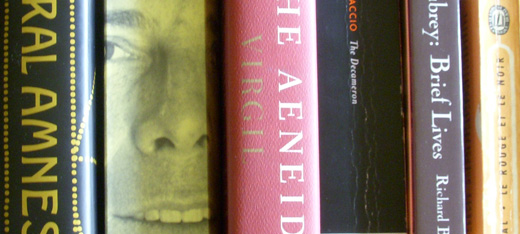Thursday Morning Read
Before altogether closing Clive James’s Cultural Amnesia: Necessary Memories From History and the Arts, I thought I’d take a look at the Introduction, which turns out to be as important as anything that follows.
But somewhere within the total field of human knowledge, humanism still beckons to us as our best reason for having minds at all.
That beckoning, however, grows increasingly feeble. The arts and their attendant scholarship are everythwere — imperishable consumer goods which a self-selecting elite can possess while priding itself as being beyond materialism; they have a glamour unprecedented in history — but humanism is hard to find. For that, science is one of the culprits: not the actual achievement of science, but the language of science, which, clumsily imitated by the proponents of Cultural Studies, has helped to make real culture unapproachable for exactly those students who might otherwise have been most attracted to it, and has simultaneously furthered the emergence and consolidation of an international cargo cult whose witch doltors have nothing in mind beyond their own advancement. By putting the humanities to careerist use, they set a bad example even to those who still love what they study. Learned books are published by the thousand, yet learning was never less trusted as something to be pursued for its own sake. Too often used for ill, it is now asked about its use for the good, and usuually on the assumption that any goodwill be measurable on a market, like a commodity. The idea that humanism has no immediately ascertainable use at all, and is invaluable for precisely that reason, is a hard sell in an age when the word “invaluable,” simply by the way it looks, is begging to be construed as “valueless” even by the sophisticated. In fact, especially by them. If the humanism that makes civilization civilized is to be preserved into this new century, it will need advocates. Those advocates will need a memory, and part of that memory will need to be of an age in which they were not yet alive.
James magnificently explodes the idea that humanism lies in the arts, in appreciating what Matthew Arnold called “the best thoughts.” The best thoughts, particularly in the century just ended, can be appreciated by dreadful monsters. A taste for Mozart is useless as a mark of distinction from the likes of Josef Mengele.
Gradually I realized that I had been looking in the wrong place. As a journalist and critic, a premature post-modernist, I was often criticized in my turn for talking about the construction of a poem and of a Grand Prix racing car in the same breath, or of treating gymnasts and high divers … as if they were practising the art of sculpture. It was a sore point, and often the sore point reveals where the real point is. Humjanism wasn’t in the separate activities: humanism was the connection between them.
In other words, humanism is a way of life, not an area of interest. And it is creative and constructive rather than reductive and principled:
Humanism was a particularized but unconfined concern with all the high-quality products of the creative impusle, which could be distinguished from the destructive one by its propensity to increaser the variety of the created world rather than reduce it.
Finally, if a tad immodestly, I’d like to echo something that James says to his younger readers:
The student who flicks through these pages in the bookshop [or on the browser] will see many strange names, and perhaps be impressed. But what impresses me is all the names that are missing.
Necessarily.

